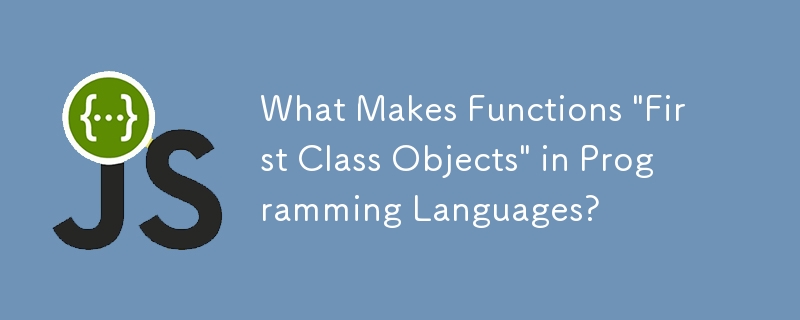Home >Web Front-end >JS Tutorial >What Makes Functions 'First Class Objects' in Programming Languages?
What Makes Functions 'First Class Objects' in Programming Languages?
- DDDOriginal
- 2024-11-16 04:44:39823browse

Understanding 'First Class Objects' in Programming Languages
In some programming languages, like JavaScript, functions possess a unique characteristic called "first class object" status. What does this distinction mean, setting them apart from other objects?
First Class Functions
According to Wikipedia, a language that supports first-class functions treats them as genuine objects capable of the following operations:
- Creating new functions during program execution
- Storing functions in data structures like arrays and objects
- Passing functions as arguments to other functions
- Returning functions as the result of other functions
In essence, functions become highly versatile and operate just like any other variable:
- Referenced as instances of the Object type
- Possessing properties and a link back to their constructor
- Assignable to variables
- Passable as parameters
- Returnable as function results
Analogy with Other Objects
Consider a typical first-class object, like a string. You can manipulate it freely:
- Assign it to a variable: var str = "Hello";
- Store it in an array: var arr = ["Hello", "World"];
- Pass it as an argument: function printString(str) { console.log(str); };
- Return it from a function: function getString() { return "Hello"; };
Functions as first-class objects share this same level of flexibility, enhancing their usefulness and enabling powerful programming paradigms.
The above is the detailed content of What Makes Functions 'First Class Objects' in Programming Languages?. For more information, please follow other related articles on the PHP Chinese website!
Related articles
See more- An in-depth analysis of the Bootstrap list group component
- Detailed explanation of JavaScript function currying
- Complete example of JS password generation and strength detection (with demo source code download)
- Angularjs integrates WeChat UI (weui)
- How to quickly switch between Traditional Chinese and Simplified Chinese with JavaScript and the trick for websites to support switching between Simplified and Traditional Chinese_javascript skills

